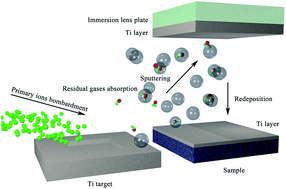Titanium pre-sputtering for an enhanced secondary ion mass spectrometry analysis of atmospheric gas elements
Abstract
Pre-sputtering before secondary ion mass spectrometry measurement is a well known technique to increase the detection limits of atmospheric gas elements: during a prolonged primary ion bombardment of a clean target a layer on the sample surface and the immersion lens is formed which decreases the re-implantation process of light elements and, as a consequence, improves the detection limits. Float zone silicon is the most commonly used target for the pre-sputtering process. In this work a metallic titanium block is considered as a suitable replacement of the pre-sputtering target. When compared to the silicon target the gettering properties of titanium allow one to reach better detection limits of hydrogen and oxygen whereas no significant improvement is observed for carbon and nitrogen. However, the optimal conditions are reached much faster for the Ti target which makes it a better choice, especially for ultra low energy measurements where standard detection limits of light elements are poor.



 Please wait while we load your content...
Please wait while we load your content...